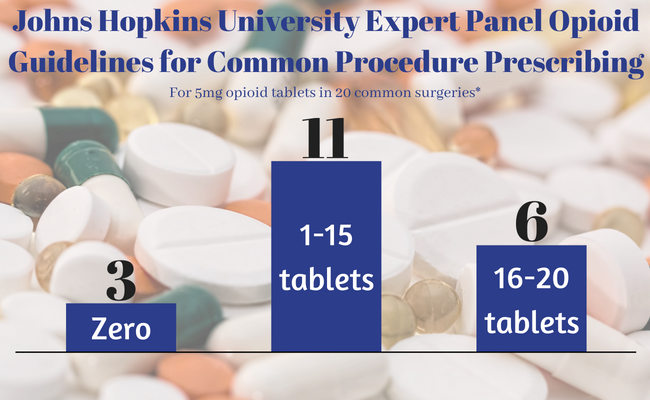Article
Johns Hopkins Releases Opioid Prescribing Recommendations for Surgeries
Author(s):
The 30-person panel, including physicians and patients, recommended a median 12.5 tablets of 5mg opioid for 20 common procedures.

What is likely the first national guidelines for operation-specific opioid prescription has been released by a panel of health care providers and patients at Johns Hopkins University.
The guideline recommendations—which were based on the premise of limiting opioid prescribing by operation rather than a blanket approach—generally call for the reduction of prescribing for different 20 common operations.
The expert panel of 30 members from 6 relevant groups (including surgeons, pain specialists, outpatient surgical nurse practitioners, surgical residents, patients, and pharmacists) developed consensus ranges for outpatient opioid prescribing for opioid-naïve adult patients following discharge for 20 common procedures across 8 surgical specialties. The guidelines are intended for patients without chronic pain undergoing uncomplicated procedures.
The panel concluded that the recommended maximum number of 5mg opioid tablets prescribed per patient should vary among the procedures. They recommended zero opioid tablets for 3 (15%) procedures, 1-15 tablets for 11 (55%) of the procedures, and 16-20 tablets for 6 (30%) of the procedures (median= 12.5 tablets). Overall, patients to have undergone the listed procedures voted for lower prescription rates than the surgeons who perform the procedures.
Orthopaedic surgery procedures drew the highest range of opioids, with the panel voting for a range 0-20 opioid tablets for 3 of the 4 listed orthopedic procedures. Meanwhile, otolaryngology procedures warranted the lowest range of opioids, with the panel recommending 0 pills for cochlear implants and 0-15 pills for thyroidectomies.
Ibuprofen was recommended for all patients by the panel, unless it was deemed medically contraindicated. The recommended minimum number of prescribed opioid tablets for each procedure was, of course, zero.
Martin Makary, MD, MPH, study senior author and a professor of surgery and health policy expert at the Johns Hopkins University School of Medicine, said the guidelines should “reset defaults that have been dangerously high for too long.”
“It’s unfortunate guidelines haven’t already existed,” Makary said in a statement. “Giving patients dangerous opioid pills they don’t need is part of how we got into this opioid crisis in the first place.”
Though the guidelines are not held as enforced practice and tackle a health condition (pain management) which requires patient-tailored flexibility, Makary expressed hope they will serve as a foundation by which doctors can collectively limit the spread of opioid addiction.
“Anywhere in range agreed upon by the panel represents a major improvement from current practice,” Makary said.
The guidelines, "Opioid-Prescribing Guidelines for Common Surgical Procedures: An Expert Panel Consensus," were published online in the Journal of the American College of Surgeons.





